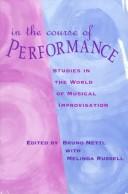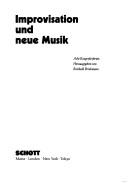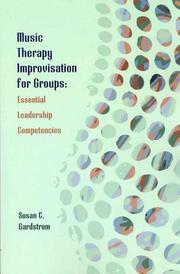| Listing 1 - 10 of 39 | << page >> |
Sort by
|
Book
ISBN: 1443863173 9781443863179 1443853445 9781443853446 1443853445 9781443853446 Year: 2014 Publisher: Newcastle upon Tyne, [England] : Cambridge Scholars Publishing,
Abstract | Keywords | Export | Availability | Bookmark
 Loading...
Loading...Choose an application
- Reference Manager
- EndNote
- RefWorks (Direct export to RefWorks)
This book is about music improvisation. It forges exciting and provocative new links between a range of theories and practices in texts that explore topics as varied as object-oriented ontology, game theory, ethical responsibility and breath. In improvisatory fashion, this book has been edited so that it weaves the texts amongst each other, subversively inserting a tactile piece of text - a text interlaced, as a woven cloth, among the contributing authors. The writings in this volume are...
Improvisation (Music) --- Extemporization (Music) --- Music --- Performance
Book
ISBN: 0429451695 042983747X 1138322970 Year: 2021 Publisher: London ; New York, New York : Routledge,
Abstract | Keywords | Export | Availability | Bookmark
 Loading...
Loading...Choose an application
- Reference Manager
- EndNote
- RefWorks (Direct export to RefWorks)
Improvisation (Music) --- Extemporization (Music) --- Music --- Performance
Book
ISBN: 9781472473271 1472473272 9781315611136 9781317048923 Year: 2017 Publisher: Abingdon, Oxon : ; New York, NY : Routledge,
Abstract | Keywords | Export | Availability | Bookmark
 Loading...
Loading...Choose an application
- Reference Manager
- EndNote
- RefWorks (Direct export to RefWorks)
In recent years, scholars and musicians have become increasingly interested in the revival of musical improvisation as it was known in the Renaissance and Baroque periods. This historically informed practice is now supplanting the late Romantic view of improvised music as a rhapsodic endeavour - a musical blossoming out of the capricious genius of the player - that dominated throughout the twentieth century. In the Renaissance and Baroque eras, composing in the mind (alla mente) had an important didactic function. For several categories of musicians, the teaching of counterpoint happened almost entirely through practice on their own instruments. This volume offers the first systematic exploration of the close relationship among improvisation, music theory and practical musicianship from late Renaissance into the Baroque era. It is not a historical survey per se, but rather aims to re-establish the importance of such a combination as a pedagogical tool for a better understanding of the musical idioms of these periods. The authors are concerned with the transferral of historical practices to the modern classroom, discussing new ways of revitalising the study and appreciation of early music. The relevance and utility of such an improvisation-based approach also changes our understanding of the balance between theoretical and practical sources in the primary literature, as well as the concept of music theory itself.
Improvisation (Music) --- Extemporization (Music) --- Music --- History. --- Performance --- History

ISBN: 0226574113 Year: 1998 Volume: *10 Publisher: Chicago London The University of Chicago Press
Abstract | Keywords | Export | Availability | Bookmark
 Loading...
Loading...Choose an application
- Reference Manager
- EndNote
- RefWorks (Direct export to RefWorks)
Extemporization (Music) --- Improvisatie (Muziek) --- Improvisation (Music) --- Improvisation (Musique) --- Improvisation (Music). --- 78.64
Book
ISBN: 9780190633585 0190633581 0190633611 019063359X 0190633603 9780190633592 9780190633615 9780190633608 Year: 2018 Publisher: New York, NY Oxford University Press
Abstract | Keywords | Export | Availability | Bookmark
 Loading...
Loading...Choose an application
- Reference Manager
- EndNote
- RefWorks (Direct export to RefWorks)
The first history of keyboard improvisation in European music in the postclassical and romantic periods, Free Play: Fantasies of Improvisation in Nineteenth-Century Music documents practices of improvisation on the piano and the organ, with a particular emphasis on free fantasies and other forms of free playing. Case studies of performers such as Abbé Vogler, J. N. Hummel, Ignaz Moscheles, Robert Schumann, Carl Loewe, and Franz Liszt describe in detail the motives, intentions, and musical styles of the nineteenth century's leading improvisers. Grounded in primary sources, the book further discusses the reception and valuation of improvisational performances by colleagues, audiences, and critics, which prompted many keyboardists to stop improvising. Author Dana Gooley argues that amidst the decline of improvisational practices in the first half of the nineteenth century there emerged a strong and influential "idea" of improvisation as an ideal or perfect performance. This idea, spawned and nourished by romanticism, preserved the aesthetic, social, and ethical values associated with improvisation, calling into question the supposed triumph of the "work."
Improvisation (Music) --- Extemporization (Music) --- History --- Music --- Performance --- improvisatie --- muziek --- muziekgeschiedenis --- anno 1800-1899 --- History.

ISSN: 04183827 ISBN: 3795717604 Year: 1979 Publisher: Mainz Schott
Abstract | Keywords | Export | Availability | Bookmark
 Loading...
Loading...Choose an application
- Reference Manager
- EndNote
- RefWorks (Direct export to RefWorks)
muziek --- Music --- muziekgeschiedenis --- improvisatie --- anno 1900-1999 --- Muziek --- 78.16 Darmstadt --- Improvisation (Music) --- Extemporization (Music) --- Congresses --- Performance
Book
ISBN: 9780199355914 0199355916 Year: 2018 Publisher: New York, NY Oxford University Press
Abstract | Keywords | Export | Availability | Bookmark
 Loading...
Loading...Choose an application
- Reference Manager
- EndNote
- RefWorks (Direct export to RefWorks)
Creative practice in music takes place in a distributed and interactive manner embracing the activities of composers, performers and improvisers-despite the sharp division of labour between these roles that traditional concert culture often presents. Two distinctive features of contemporary music are the greater incorporation of improvisation and the development of integrated and collaborative working practices between composers and performers. By blurring the distinction between composition and performance, improvisation and collaboration provide important perspectives on the distributed creative processes that play a central role in much contemporary concert music. This volume explores how collaboration and improvisation enable and constrain these creative processes.
Composition (Music) --- Improvisation (Music) --- Music --- Extemporization (Music) --- Collaborative composition (Music) --- Artistic collaboration --- Collaboration --- History and criticism --- Performance

ISBN: 1283367009 9786613367006 1891278703 9781891278709 9781283367004 1891278495 9781891278495 6613367001 Year: 2007 Publisher: Gilsum, NH Barcelona
Abstract | Keywords | Export | Availability | Bookmark
 Loading...
Loading...Choose an application
- Reference Manager
- EndNote
- RefWorks (Direct export to RefWorks)
This unprecedented book provides clinicians, educators, and trainers with knowledge-based and skill-based competencies in group improvisation leadership and a suggested sequence for instruction in these specific competencies. The competencies pinpointed fall into three categories: Preparatory Skills (before the improvisation), Facilitative Skills (during the improvisation), and Verbal Processing Skills (after the improvisation). The book contains clinical vignettes and 80 exercises designed to reinforce competency in the aforementioned areas. (
Improvisation (Music) --- Music therapy. --- Music --- Musical therapy --- Musicotherapy --- Therapeutics --- Psychotherapy and music --- Extemporization (Music) --- Therapeutic use --- Performance
Book
ISBN: 0199995788 9780199995783 0199995761 9780199995769 9781306290944 1306290945 Year: 2014 Publisher: New York City Oxford University Press, USA
Abstract | Keywords | Export | Availability | Bookmark
 Loading...
Loading...Choose an application
- Reference Manager
- EndNote
- RefWorks (Direct export to RefWorks)
Hear, Listen, Play! is a book for all music teachers who are unfamiliar with, yet curious about the worlds of ear-playing, informal learning, improvisation, and vernacular musics. For decades, or even hundreds of years, a divide has slowly been developing between the realms of notation-based musical transmission, and aural/oral methods. Yet that divide is by no means a necessary aspect of music learning, and musicians who are lucky enough to dwell on both sides of it count themselves as so much the richer for doing so. This book aims to provide a door into those other worlds for any teacher wh
Music --- Improvisation (Music) --- Extemporization (Music) --- Education, Musical --- Music education --- Musical education --- Musical instruction --- Instruction and study. --- Performance --- Study and teaching
Book
ISBN: 9780199590957 0199590958 Year: 2010 Publisher: New York : Oxford University Press,
Abstract | Keywords | Export | Availability | Bookmark
 Loading...
Loading...Choose an application
- Reference Manager
- EndNote
- RefWorks (Direct export to RefWorks)
In The Improvising Mind, these questions are explored through an interdisciplinary approach that draws on cognitive neuroscience, the study of historical pedagogical treatises on improvisation, interviews with improvisers, and musical analysis of improvised performances. Findings from these treatises and interviews are discussed from the perspective of cognitive psychological theories of learning, memory, and expertise. Musical improvisation has often been compared to 'speaking a musical language.' While past research has focused on comparisons of music and language perception, few have dealt with the music language comparison in the performance domain. In this book, learning to improvise is compared with language acquisition, and improvised performance is compared with spontaneous speech from both theoretical and neurobiological perspectives. Tackling a topic that has hitherto received little attention, the Improvising Mind is a valuable addition to the literature in music cognition. This book will be of interest to musicologists, music theorists, cognitive neuroscientists and psychologists, musicians, music educators, and anyone with an interest in creativity. --Book Jacket. The ability to improvise represents one of the highest levels of musical achievement. An improviser must master a musical language to such a degree as to be able to spontaneously invent stylistically idiomatic compositions on the spot. This feat is one of the pinnacles of human creativity, and yet its cognitive basis is not completely understood. What musical knowledge is required for improvisation? How does a musician learn to improvise? How is this knowledge used in performance? What are the neural correlates of improvised performance?
Music --- Improvisation (Music) --- Musique --- Improvisation (Musique) --- Psychological aspects --- Aspect psychologique --- 373.67 --- Creatief denken --- Creativiteit --- Extemporization (Music) --- Psychological aspects. --- Onderzoek (muziek) --- Performance
| Listing 1 - 10 of 39 | << page >> |
Sort by
|

 Search
Search Feedback
Feedback About UniCat
About UniCat  Help
Help News
News